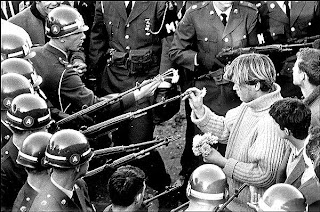There is a major importance of sym bolism within any aspect of art or literature when it comes to analyzing anything. The idea of signs falls into the structural approach of analyzing. The term semiotics or semiology (coined by Ferdinand De Saussure) are two common phrases for the study of signs. The sign is not specific to the tin metal bolted to staple riddled wood posts on the highways. It can range from an object to an action. De Saussure implied that using semiology aids in making critical analysis a scientific procedure. The picture above is one that has been recreated in many contemporary mediums. A stock photo of a protests that took place in the 1960s. A standoff between two forces, one in black and one in white.
bolism within any aspect of art or literature when it comes to analyzing anything. The idea of signs falls into the structural approach of analyzing. The term semiotics or semiology (coined by Ferdinand De Saussure) are two common phrases for the study of signs. The sign is not specific to the tin metal bolted to staple riddled wood posts on the highways. It can range from an object to an action. De Saussure implied that using semiology aids in making critical analysis a scientific procedure. The picture above is one that has been recreated in many contemporary mediums. A stock photo of a protests that took place in the 1960s. A standoff between two forces, one in black and one in white.
One of the first things that the eye notices is the contrast of colors, emphasized even more since the photo is in black and white. An understanding of archetypes can be seen when we remove personal politics and allowed to only speak to us through the signs being shown. The police are lined up in dark gear with helmets and guns. Black is a sign that has constantly been synonymous with evil or oppression or, simply stated, bad. The guns are also strong images of force, oppression, and death. Already the police line is type-casted as the villains, the antagonistic force.
Then there is the gentleman delicately planting flowers into the barrels of the guns that could very easily ruin his day. He is in a white sweater, has lighter hair, and overall gives the impression of innocence or purity. He is not using force, and within the boundaries of the picture, he is easily outnumbered. Both the flowers and the color white would automatically align him with the good or the heroes, the protagonists.
These signs which help create the archetype's of literature are important to understand because it gives a good basis for critical reception. A sign has the potential to change over time, but Northop Frye attempted to pinpoint an archetype that remained constant, or at least that was the impression I got from his article. If these archetype's, which are based off of an objective understanding of signs, are defied, it helps create genre. A satire would defy the conventional ideas surrounding the sign. For narrative sake, if the police suddenly began to open fire on the white clad person and impaled him with the same flowers he had just planted in their gun barrels were portrayed as the heroes, how would the interpretation of the signs change?
How would the signs read if the guy in white was actually a mass-murderer or cult leader like Jim Jones who was finally tracked down by police to face judgment for the crimes he committed?
A better understanding of signs would have come with the narrative. I couldn't think of anything clever enough to fulfill the small narrative, so I am just going to ask questions and make statements that I think are educated from my interpretation of the readings. One big indicator for symbolism is the point of view. Who is telling the story and what are his characteristics? Who are the other characters and what significance do they play into the story? What is the placement, displacement, replacement formula that creates the plot? Who is really being wronged or righted in this story? Am I doing this right?